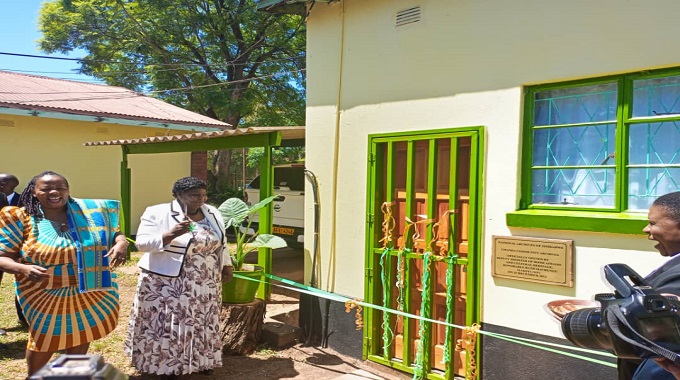Community Archive Centre opened in Gwanda

Bongani Ndlovu, Chronicle Reporter
COMMUNITY Archive Centres are important in the information value chain and the Government recognises that effective management of records and archives is essential for good governance and administrative transparency.
This was said yesterday by Home Affairs and Cultural Heritage Deputy Minister Ruth Maboyi during the official opening of the Gwanda Community Archive Centre in Matabeleland South province.

Gwanda Community Centre
The Community archive is located at Gwanda Municipality offices. The Gwanda Community Archive Centre was set up by the Ministry of Home A airs and Cultural Heritage under the 100-day Cycle as part of the National Development Strategy 1 (NDS1).
e Ministry of Home A airs and Cultural Heritage has so far established seven community archives and these are at Arcturus High School (Mashonaland East province), Harare Girls High (Harare), ZCC Mbungo (Masvingo), Shabani Mine (Midlands), Kariba (Mashonaland West) and in Gwanda Matabeleland South and the one in Chipinge (Manicaland) will be launched soon.
Th e idea of establishing community archives was conceived in ful lment of President Mnangagwa’s vision of leaving no one and no place behind.

President Mnangagwa
The main idea of having Community Archives Centres is to bring services close to the people. For instance, if chiefs want information on their lineage, it will be available at the community level instead of going to Harare.
The archives are created or preserved by individuals and community groups, who desire to document their cultural heritage based on shared experiences, interests, and/or identities. During her keynote address, Deputy Minister Maboyi said the establishment of the Community Archive Centres is part of the Government’s devolution thrust.
“The department of National Archives of Zimbabwe considers these community archives as an important player in the information value chain and recognises the effective management of records and archives as an essential tool for good governance and administrative transparency,” said Deputy Minister Maboyi.
“This is in a bid to bring archives to the communities as a way of promoting and preserving institutional memory spaces.
This is in line with the Government’s thrust to empower the grassroots as we march towards Vision 2030 as espoused by President Mnangagwa who said that no one and no place must be le behind.” Deputy Minister Maboyi said the programme will cascade to district level so that more archival data can be collected and accessed by communities at grassroots level.
“ The Government strives to establish more community archives that will help in the knowledge transfer on records and archives thus creating an archiving culture, amongst institutions and communities.
“After the fulfilment of this target, the Ministry under NDS2 intends to cascade it to the district level to the village level so that we all move together. Marcus Garvey noted that a people without their history knowledge and culture is like a tree without roots,” said Deputy Minister Maboyi.
She added that the initiative is also an attempt to provide a platform to the previously marginalised and under documented communities.

Deputy Minister of Home Affairs and Devolution Ruth Maboyi officially opens the Gwanda Community Centre
In a speech read on his behalf by Provincial Secretary for Provincial A airs and devolution, Mrs Lathiso Dlamini-Masuku, Matabeleland South Minister for Provincial A airs and Devolution Abednico Ncube said the Community Archive Centre will cement the rich history of the province. “This day is not just important for the Matabeleland South Community but the whole country and most importantly, the Gwanda Community as we celebrate the unveiling of a Community Archives that immortalises the diverse Rainbow history and cultures of the people of Matabeleland South Province and Gwanda in particular.
The initiative entails documenting, recording and exploring community heritage through local participation, control and ownership of projects that are crucial in ensuring that the country’s history is captured accurately and preserved,” said Minister Ncube.
He said the development of cultural and heritage products as well as services such as the Gwanda Community Archives will undoubtedly go a long way in acquiring, preserving and providing access to National Cultural Heritage as well as improving the livelihoods of communities.
“A nation without a history, has no identity and a culture and hence is dead. Let us remember that Ilizwe lakhiwa ngabaninilo, nyika inovakwa nevene vayo.”










Comments